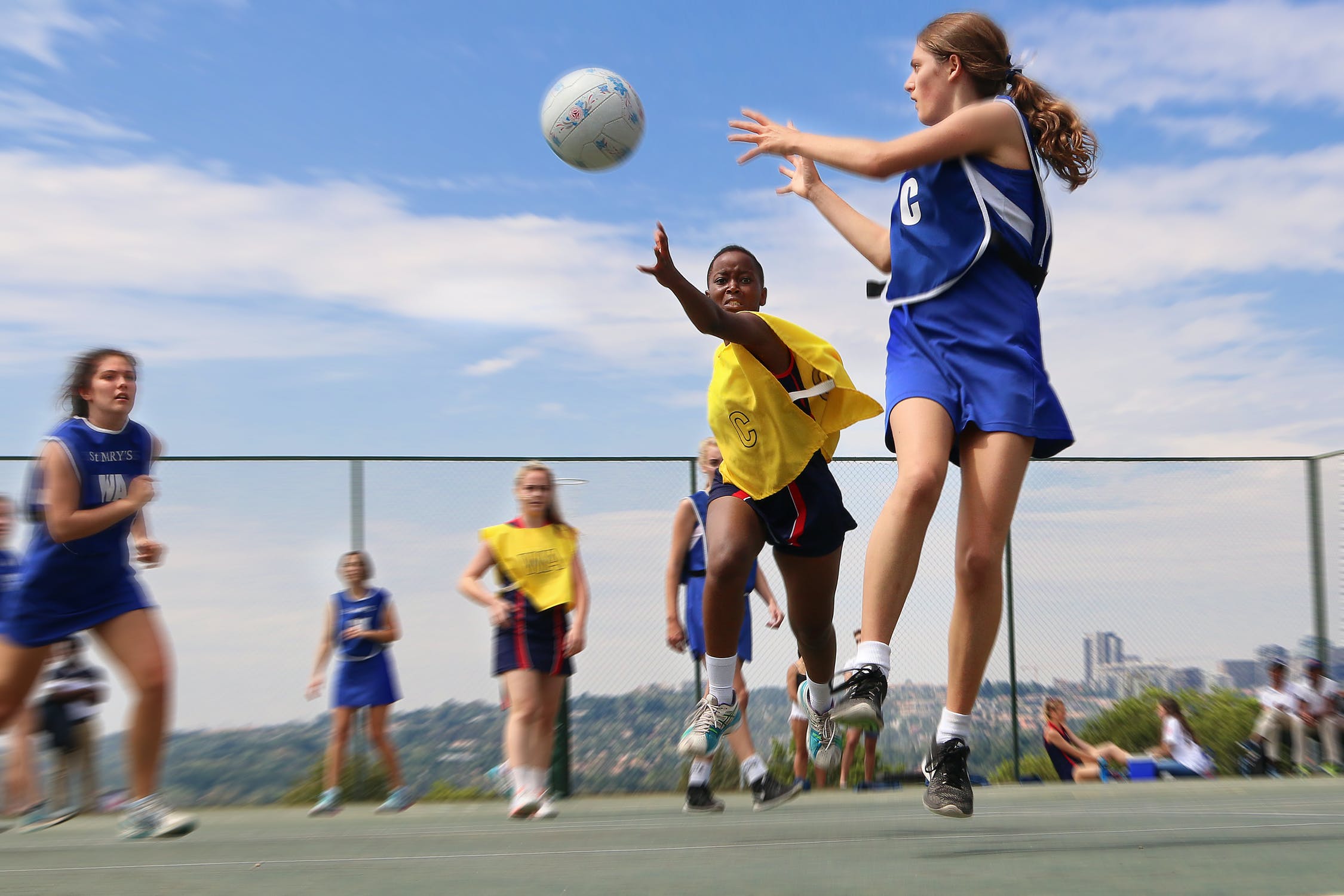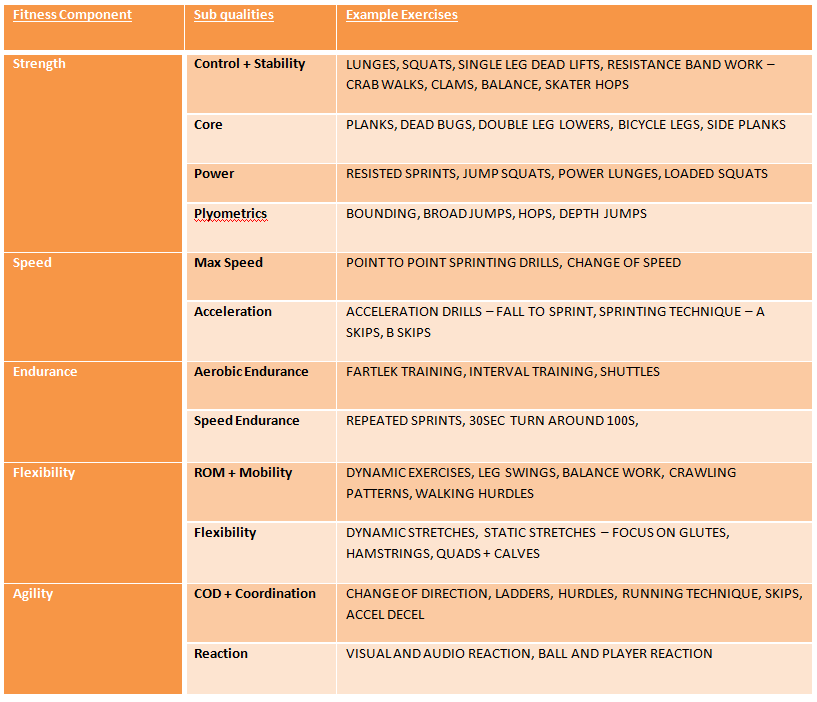
Pre-season strength and conditioning programs prepare athletes for their upcoming season. Building a foundation is important for improving skills, preventing future injury, and quickly enhancing overall fitness. In the off-season, athletes are resting to mentally and physically recharge for another year of competition. Although preseason strength and conditioning is challenging, it helps athletes transition into high-intensity training and keep them strong throughout their competition season. Pre-season should incorporate all areas of fitness: Strength, Endurance, Speed, Agility and Flexibility. A good pre-season can reduce injury rates and improve performance throughout the season.
Aim of Pre-season
The aim of pre-season should be to create a strong base in these areas of fitness in preparation for the season. Pre-season strength and conditioning programs focus on re-engaging and activating an athlete’s muscles after the restful off-season. Before athletes can dive into speed, skill, and power training, they need to focus on regaining full-body strength and endurance. Trying to make significant gains during the season can lead to injuries, as the body does not have time to recover from weekend games.
Pre-season should not be too intense to cause injuries before the season starts. Volume should be high but intensity should be low. Be aware of players also competing in summer sports, as they require a less intense pre season.
Pre-season Training
Pre-season should start with low intensity, high volume training slowly increasing intensity and dropping volume as the start of the season approaches. This is key as you don’t want to overload the players but you want them to be performing at competition intensity. Introduce skills exercises to allow players to break up more intense sessions and refine their skills when fatigued.
For older athletes a more structured pre-season can be adopted however, for younger age groups incorporate games. For example:
Speed and Agility: bull rush or tip, Power: leap frog

A review in the Journal of Sports Medicine concluded that strength and conditioning training reduces sports injuries to less than 1/3 and overuse injuries were almost halved. With a long competitive season down the road, athletes should take advantage of preseason strength training and minimize injury.
Sports Testing
Sports testing can be useful in identifying areas of fitness that need to be addressed. All athletes begin with a different baseline, so it’s important to assess each athlete’s movement patterns individually. For example a player may need to focus more on power during preseason while a teammate might benefit more from speed exercises. Being able to individualise pre-season programs will help reduce injury risk across the whole team and increase the team’s performance.
Sports testing critically evaluates the most important athletic performance attributes, allowing coaches and athletes to identify strengths and weaknesses of the individual athlete and team. We can then design pre-season programs specifically targeting weaknesses of the athlete. We have up-to-date data, modern equipment including high performance timing gates and standardised protocols that allow us to test individual and team performance comprehensively. Testing protocols aim to mirror the AIS and will establish your athletes’ baseline endurance, speed, agility, power and flexibility. Improvements in these test results will help to facilitate optimal performance and reduce the risk of injury.
For more information head to https://tmphysio.com/sports-testing/
Example Training
Periodisation Template
General Prep period allows a foundation to be laid, utilizing the lack of game skill sessions you can focus heavily on endurance, strength and flexibility.
The specific prep period is when you start to focus more on game skills and can start to train speed and plyometrics.

This template allows you to decide what you want to train each week. As you come into competition you should no longer train endurance as there is not enough time for players to recover after weekend games.
By selecting 2-3 fitness components and then 3-4 sub-qualities for 5-7min each you can spend 20-25min each training session working on different areas for the entire season.
Example Exercises for Training Sessions

If you require a more detailed explanation, please do not hesitate to contact us. We can come down to team training or run a session for the coaches.
Some of the exercises above can be found here:https://tmphysio.com/exercises/pre-season-guidelines/
Warm Up
Warming up prior to starting a training session is of great importance no matter what time of the season it is. Warm-up sessions will include a combination of cardiovascular exercises, stretching and strength drills. The cardiovascular exercises are designed to increase circulation, increase body temperature and bring the heart rate up, while stretching warms the muscles and prepare them for the movements they will be required to carry out during the training session.
A popular warm up program for netball is the KNEE PROGRAM. It was written by Netball Australia to help reduce the number of knee related injuries and enhance efficiency on court.
Its 4 key components include:
- Good Landing
- Good Deceleration
- Good Take off
- Good Change of direction
The Warm Up components are listed below:
- Jogging up and back along the court
- Walking A’s
- Butt Kicks
- Shuffling forwards and backwards
- Side to side
- Walking lunge
- Walking glute stretch
- Walking quad stretch
The program also includes strength and balance exercises.
More information on this program and exercise descriptions can be found on our website at https://www.tmphysio.com/exercises/warm-guidelines/the-knee-program/
Need more information
Tailor Made Physiotherapy can provide further information and support regarding pre-season and sports testing. We are passionate about creating resilient athletes that can play sport for years to come.
We are happy to help if you require any further information and can also assist with drills or attend training sessions.
Please call us if you have any questions on 9481 9856 or email paul@tmphysio.com
